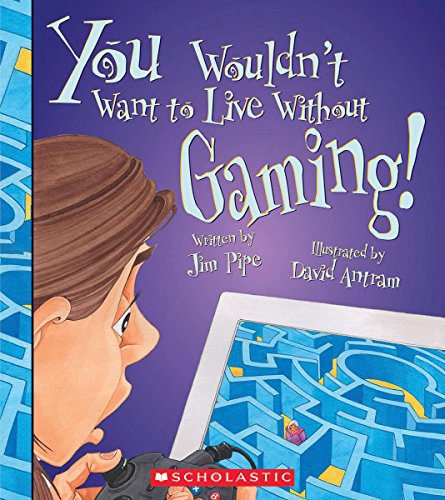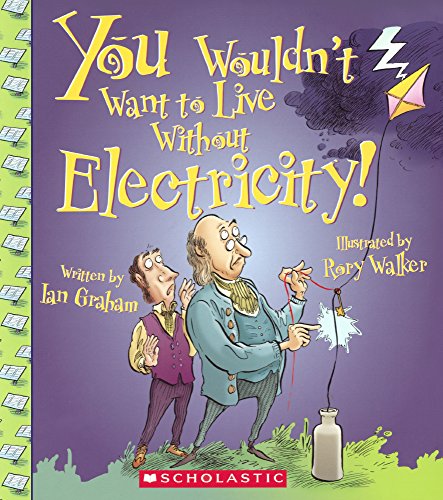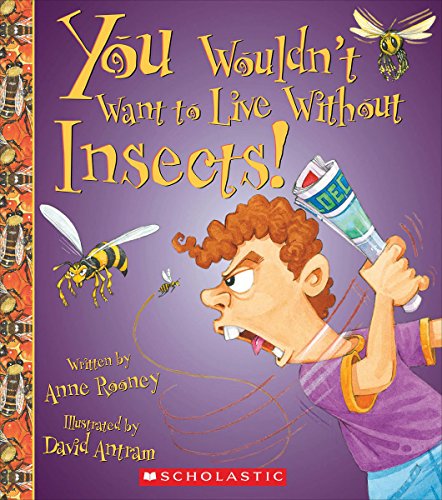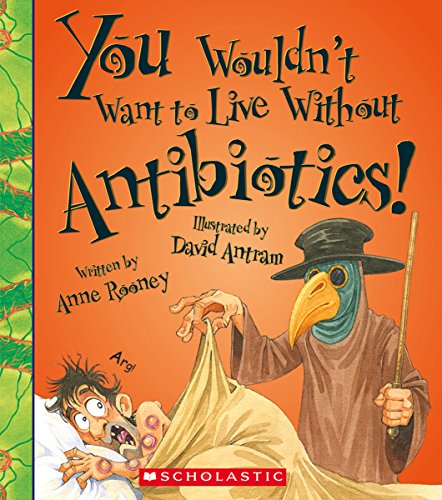-
You Wouldn't Want to Live Without Gaming!
Jim Pipe, David Antram
Library Binding (Franklin Watts, Sept. 1, 2018)Learn about the many uses and positive effects of video games: how they can be a teaching aid, exercise our bodies and brains, stimulate our creativity, and bring people together.This series takes readers (Ages 8-12) on a historical journey, examining how people coped in the past and how they developed ingenious ways to make life safer and less unpleasant. Each book features full-color cartoon-style illustrations and hilarious speech bubbles to heighten interest, making the series attractive even to reluctant readers.Humans have always loved to play games, from dice games in ancient Iran 5,000 years ago to chess and cards in the Middle Ages. While Victorians loved board games, the first video games appeared over 50 years ago. Today, fanaticism over console games is at an all-time high, with players arguing passionately why one console is better than another. S
S
-
You Wouldn't Want to Live Without Math!
Anne Rooney, Mark Bergin
Library Binding (Franklin Watts, Sept. 1, 2016)Imagine how difficult life would be if you couldn't count things, measure anything, do any calculations or be precise about time, distance or price.This series takes readers (Ages 8-12) on a historical journey, examining how people coped in the past and how they developed ingenious ways to make life safer and less unpleasant. Each book features full-color cartoon-style illustrations and hilarious speech bubbles to heighten interest, making the series attractive even to reluctant readers.You might not like numbers and math when you have to do your maths homework, but it would be hard to live without them. You wouldn't know how old you are, or how long you have to wait until it's the holiday. We couldn't build anything accurately, we'd have no computers and you couldn't even go shopping. No, you wouldn't want to live without math! S
S
-
You Wouldn't Want to Live Without Satellites!
Ian Graham, Mark Bergin
Library Binding (Franklin Watts, Sept. 1, 2018)This series takes readers (Ages 8-12) on a historical journey, examining how people coped in the past and how they developed ingenious ways to make life safer and less unpleasant.Each book features full-color cartoon-style illustrations and hilarious speech bubbles to heighten interest, making the series attractive even to reluctant readers.A satellite is a small object traveling around something bigger. The Moon is a natural satellite of Earth. A spacecraft launched into orbit around Earth is an artificial satellite. Since Sputnik-1, about 6,000 more satellites have been launched by 40 countries. Nearly 4,000 are still in orbit, and about 1,000 of them are still working. Learn about how we use satellites every day without knowing it to talk on the telephone, watch television, use the internet, predict the weather, navigate the landscape, and run businesses. W
W
-
You Wouldn't Want To Live Without Electricity
Ian Graham, Rory Walker
Library Binding (Turtleback, Sept. 1, 2014)FOR USE IN SCHOOLS AND LIBRARIES ONLY. Uses humor in both text and illustrations to describe what it would be like to live without the electric power that makes modern life possible. S
S
-
You Wouldn't Want to Live Without Insects!
Anne Rooney, David Antram
Library Binding (Franklin Watts, Feb. 1, 2015)What if there were no bugs?Nasty stinging creatures that destroy crops and spread disease-if that's your opinion of insects, read this fascinating book to discover the other side of the story. Without insects to pollinate flowers, we would have no fruit. Without bees, we would have no honey. Maggots eating a dead animal are not a pretty sight-but without them, we would have to find some other way to dispose of dead animals. This fascinating new title in the You Wouldn't Want to Live Without series shows insects at their best and worst. And, thanks to a simple experiment with drinking straws, you can even see the world through an insect's eyes. S
S
-
You Wouldn't Want to Live Without Poop!
Alex Woolf, David Antram
Library Binding (Franklin Watts, Jan. 15, 2016)We all do it. We usually don't like to talk about it, but going to the toilet is a natural and necessary part of our lives.This series takes readers (Ages 8-12) on a historical journey, examining how people coped in the past and how they developed ingenious ways to make life safer and less unpleasant. Each book features full-color cartoon-style illustrations and hilarious speech bubbles to heighten interest, making the series attractive even to reluctant readers.We couldn't live without poop because there are some parts of our food that contain no nutrients that can be used by our bodies for energy, growth or health, and those parts have to be ejected. But poop can also be used to power our cars, heat our homes and help grow our crops. Learn why and how animals and people produce poop, and about the many marvellous uses for this misunderstood substance. R
R
-
You Wouldn't Want To Live Without Glass!
Ian Graham
Library Binding (Turtleback Books, Sept. 1, 2016)FOR USE IN SCHOOLS AND LIBRARIES ONLY. S
S
-
You Wouldn't Want to Live Without Money!
Alex Woolf, David Antram
Library Binding (Franklin Watts, Sept. 1, 2015)What if money never existed?None of us has as much money as we would like, but imagine if money didn't exist at all. How would we buy the things we need, or sell the things we don't need? Who would decide whether a basket of fruit is worth the same as a hunting spear? Many things have been used as money, from live animals through cowrie shells to plastic cards. Learn how moneylending grew into today's banking industry, and how credit allows us to spend money we don't even have. S
S
-
You Wouldn't Want to Live Without Bacteria!
Roger Canavan, Mark Bergin
Library Binding (Franklin Watts, Feb. 1, 2015)They are far too small to be seen with the naked eye, but bacteria are one of the most widespread forms of life-and one of the oldest.This series takes readers (Ages 8-12) on a historical journey, examining how people coped in the past and how they developed ingenious ways to make life safer and less unpleasant. Each book features full-color cartoon-style illustrations and hilarious speech bubbles to heighten interest, making the series attractive even to reluctant readers. They appeared on Earth more than 3 billion years before the first dinosaurs. Some bacteria cause deadly diseases, but many are harmless or even helpful to humans and other animals. They fertilize the soil by breaking down dead material into useful chemicals, and they are an essential ingredient in many foods. Bacteria in our own bodies are a vital part of the digestive process. T
T
-
You Wouldn't Want To Live Without Money!
Alex Woolf, David Antram
Library Binding (Turtleback Books, Sept. 1, 2015)FOR USE IN SCHOOLS AND LIBRARIES ONLY. None of us has as much money as we would like, but imagine if money didn t exist at all. How would we buy the things we need, or sell the things we don t need? Who would decide whether a basket of fruit is worth the same as a hunting spear? Many things h S
S
-
You Wouldn't Want to Live Without Antibiotics
Anne Rooney
Library Binding (Franklin Watts, Sept. 1, 2014)If antibiotics had not been discovered, would you be alive today? Nowadays we can treat all sorts of nasty injuries and illnesses, but it certainly wasnt so straightforward hundreds of years ago. In this title from the fantastic new You Wouldnt Want to Live Without series, youll learn all about the bizarre and gruesome ways that people used to combat infection: from maggots, to leeches, to moss! As you discover how bacteria work in your body, learn handy hints on how to survive throughout the ages, and discover how medicine is used in the present day, youll soon see why you really, really, wouldnt want to live without antibiotics! The well-organized text in this title allows readers to explore relationships between historic scientific events. Grade-appropriate contexts help readers determine the meaning of academic words and phrases while the vivid illustrations and text features help navigate the text and locate answers to questions.
-
You Wouldn't Want to Live Without Soap!
Alex Woolf, Mark Bergin
Library Binding (Franklin Watts, Sept. 1, 2015)What if there was no soap?Would you rather put your grubby clothes in the washing machine, or take them down to the river and beat the dirt out of them? You're lucky to have the choice! Soaps and detergents are among the great benefits of modern life. They help to keep us comfortable and save us from smelling unpleasant, but above all, they help to protect us from the germs that cause infectious diseases. Learn how soap works, how it is made, and how much harder life would be if we really did have to live without it. W
W